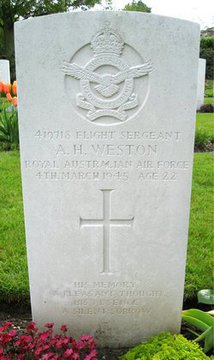
WESTON, Alexander Harold
| Service Number: | 419718 |
|---|---|
| Enlisted: | 15 September 1942 |
| Last Rank: | Flight Sergeant |
| Last Unit: | No. 12 Squadron (RAAF) |
| Born: | Collingwood, Yarra City, Victoria, Australia, 8 July 1922 |
| Home Town: | Not yet discovered |
| Schooling: | Not yet discovered |
| Occupation: | Not yet discovered |
| Died: | Flying Battle, Lincolnshire, United Kingdom, 4 March 1945, aged 22 years |
| Cemetery: |
Cambridge City Cemetery, United Kingdom Grave 15104. Personal Inscription HIS MEMORY, A PLEASANT THOUGHT. HIS ABSENCE, A SILENT SORROW, Cambridge City Cemetery, Cambridge, Cambridgeshire, England, United Kingdom |
| Memorials: | Australian War Memorial Roll of Honour, International Bomber Command Centre Memorial |
World War 2 Service
| 3 Sep 1939: | Involvement Flight Sergeant, 419718 | |
|---|---|---|
| 15 Sep 1942: | Enlisted Royal Australian Air Force, Flight Sergeant, 419718, No. 12 Squadron (RAAF) |
Help us honour Alexander Harold Weston's service by contributing information, stories, and images so that they can be preserved for future generations.
Add my storyBiography contributed by Geoffrey Gillon
Flight Sergeant Weston was 22 and the son of Evan Harold Edward and Laura Evelyn Weston of Parkville, Victoria, Australia.
A relatively new memorial on the village green in East Stockwith, Lincolnshire incorporates a propeller blade from the actual aircraft and remembers the 12 Squadron crew lost on 03-04/03/45.
The Lancaster bomber, ME 323, Code named PH-P, had departed Wickenby for a routine night training flight.
It was intercepted near Hull by a Luftwaffe Intruder captained by Lt Gunther Wolf (IX/NJG5) and shot down for his 4th Abschusse at 01:08.
The aircraft crashed between the villages of East Stockwith and Blyton at 0110 with the loss of all seven crew, 5 of whom were Australian Flight Sergeants. This loss was one of the many victims of the Luftwaffe's infamous but ill fated Unternehman Gisela (Operation Gisela) when large numbers of enemy aircraft on "Intruder Ops" infiltrated the bomber stream returning to the UK from Ops Kamen. They wrought havoc shooting down multiple aircraft across the length of the East Coast of England but sustained significant losses themselves in what was regarded as the Luftwaffe's "last ditch action" at this stage of WWII











